小说1984介绍
《1984》内容概括

《1984》内容概括《1984》是英国作家乔治·奥威尔于1949年创作的一部反乌托邦小说。
小说以极权主义政府控制下的大英帝国为背景,描绘了一个虚构的纯粹主义极权国家,通过人物的幻想和追思,展现了极权主义对个人自由的摧毁和对思想的控制。
小说中的主人公温斯顿是一名年轻的记者,他在被选中成为一个科学研究项目的试验品后,逐渐发现自己陷入了一个虚假的现实中。
在这个国家中,每个人都被洗脑成为单一的极权主义信仰的传声筒,所有的思想和行为都必须服从于政府的命令和控制。
主人公温斯顿试图抵制这个虚假的现实,但他却遭到了政府的追杀和迫害。
小说中的政府是一个极权主义政府,它通过各种手段来控制人们的思想和行为。
政府实行思想统一政策,强制人们接受单一的政治观点和价值观念,禁止个人有任何异议和思考能力。
政府还实行集体主义政策,将个人的私人生活和自由全面压制,要求人们绝对服从政府的命令和控制。
政府还实行监控政策,通过各种手段来监视人们的生活和行为,防止任何异端思想和行为的出现。
小说中的人物形象也是极权主义社会中的产物。
每个人都被洗脑成为单一的极权主义信仰的传声筒,失去了自我意识和独立思考能力。
每个人都是被政府控制和利用的工具,没有任何个人自由和权利。
主人公温斯顿试图抵制这个虚假的现实,但他却遭到了政府的追杀和迫害。
他的朋友和同事们也都受到了政府的监视和控制,他们的思想和行为也都被政府所左右。
在极权主义社会中,个人自由和尊严被彻底摧毁。
人们的思想和行为都必须服从于政府的命令和控制,没有任何个人自由和权利。
主人公温斯顿试图反抗这个虚假的现实,但他却遭到了政府的追杀和迫害。
他的朋友和同事们也都受到了政府的监视和控制,他们的思想和行为也都被政府所左右。
《1984》是一部深刻揭示极权主义社会危害的小说。
小说中揭示了极权主义政府对个人自由和尊严的摧毁和对思想的控制,展现了极权主义社会中人类命运的悲惨和无助。
通过对极权主义社会的分析和批判,《1984》也呼吁人们反思现实,追求更加自由、平等、尊重和有尊严的生活方式。
《1984》主要情节概括-1984主要情节
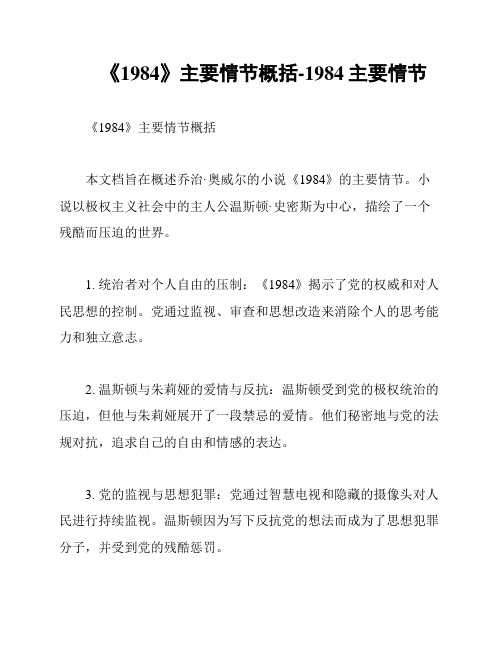
《1984》主要情节概括-1984主要情节
《1984》主要情节概括
本文档旨在概述乔治·奥威尔的小说《1984》的主要情节。
小说以极权主义社会中的主人公温斯顿·史密斯为中心,描绘了一个残酷而压迫的世界。
1. 统治者对个人自由的压制:《1984》揭示了党的权威和对人民思想的控制。
党通过监视、审查和思想改造来消除个人的思考能力和独立意志。
2. 温斯顿与朱莉娅的爱情与反抗:温斯顿受到党的极权统治的压迫,但他与朱莉娅展开了一段禁忌的爱情。
他们秘密地与党的法规对抗,追求自己的自由和情感的表达。
3. 党的监视与思想犯罪:党通过智慧电视和隐藏的摄像头对人民进行持续监视。
温斯顿因为写下反抗党的想法而成为了思想犯罪分子,并受到党的残酷惩罚。
4. 史密斯追求自由的坚持:温斯顿不断回忆过去的自由,努力保留和表达个人思想。
他通过与奥布里恩建立联系,试图加入反抗政府的地下组织。
5. 最终的背叛与破坏:奥布里恩实际上是党的间谍,他背叛了温斯顿并将他交给了党。
温斯顿最终在改造中认同了党的思想,并丧失了自我。
以上是《1984》主要情节的概括,小说通过生动的笔触揭示了权力对个体的控制和艰难的反抗之旅。
《1984》乔治奥威尔
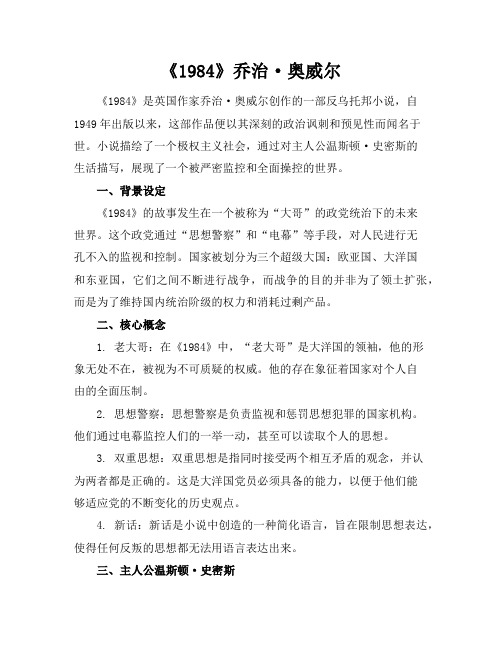
《1984》乔治·奥威尔《1984》是英国作家乔治·奥威尔创作的一部反乌托邦小说,自1949年出版以来,这部作品便以其深刻的政治讽刺和预见性而闻名于世。
小说描绘了一个极权主义社会,通过对主人公温斯顿·史密斯的生活描写,展现了一个被严密监控和全面操控的世界。
一、背景设定《1984》的故事发生在一个被称为“大哥”的政党统治下的未来世界。
这个政党通过“思想警察”和“电幕”等手段,对人民进行无孔不入的监视和控制。
国家被划分为三个超级大国:欧亚国、大洋国和东亚国,它们之间不断进行战争,而战争的目的并非为了领土扩张,而是为了维持国内统治阶级的权力和消耗过剩产品。
二、核心概念1. 老大哥:在《1984》中,“老大哥”是大洋国的领袖,他的形象无处不在,被视为不可质疑的权威。
他的存在象征着国家对个人自由的全面压制。
2. 思想警察:思想警察是负责监视和惩罚思想犯罪的国家机构。
他们通过电幕监控人们的一举一动,甚至可以读取个人的思想。
3. 双重思想:双重思想是指同时接受两个相互矛盾的观念,并认为两者都是正确的。
这是大洋国党员必须具备的能力,以便于他们能够适应党的不断变化的历史观点。
4. 新话:新话是小说中创造的一种简化语言,旨在限制思想表达,使得任何反叛的思想都无法用语言表达出来。
三、主人公温斯顿·史密斯温斯顿·史密斯是《1984》中的核心人物,他在真理部工作,负责篡改历史记录,以符合党的最新指示。
尽管生活在严密的监控之下,温斯顿仍然对自由和真相抱有渴望。
他的内心反叛逐渐引导他走向了对党的反抗之路,但这条道路充满了危险和背叛。
四、爱情的禁果在《1984》的极权世界里,爱情被视为一种可能引发反叛情感的危险事物。
温斯顿与朱丽娅的相遇和相恋,成为了他对体制反抗的一部分。
他们的爱情是秘密的,每一次的约会都是一场与思想警察的较量。
在党的眼中,性是用于繁殖的工具,而非表达个人情感的方式。
1984简介
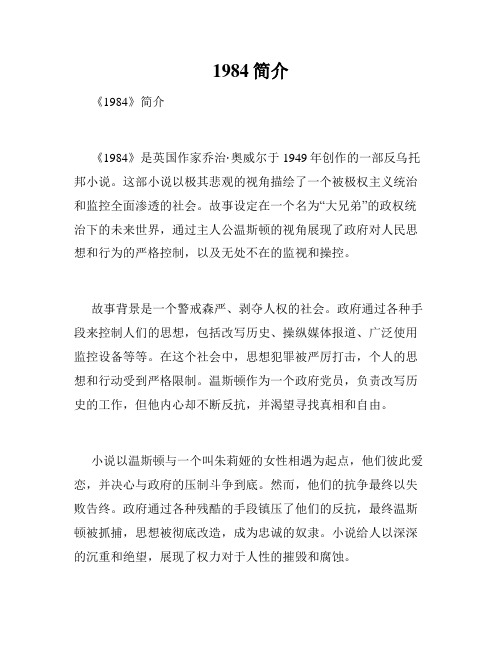
1984简介《1984》简介《1984》是英国作家乔治·奥威尔于1949年创作的一部反乌托邦小说。
这部小说以极其悲观的视角描绘了一个被极权主义统治和监控全面渗透的社会。
故事设定在一个名为“大兄弟”的政权统治下的未来世界,通过主人公温斯顿的视角展现了政府对人民思想和行为的严格控制,以及无处不在的监视和操控。
故事背景是一个警戒森严、剥夺人权的社会。
政府通过各种手段来控制人们的思想,包括改写历史、操纵媒体报道、广泛使用监控设备等等。
在这个社会中,思想犯罪被严厉打击,个人的思想和行动受到严格限制。
温斯顿作为一个政府党员,负责改写历史的工作,但他内心却不断反抗,并渴望寻找真相和自由。
小说以温斯顿与一个叫朱莉娅的女性相遇为起点,他们彼此爱恋,并决心与政府的压制斗争到底。
然而,他们的抗争最终以失败告终。
政府通过各种残酷的手段镇压了他们的反抗,最终温斯顿被抓捕,思想被彻底改造,成为忠诚的奴隶。
小说给人以深深的沉重和绝望,展现了权力对于人性的摧毁和腐蚀。
《1984》不仅揭示出对于个体自由的威胁,也对当时的社会政治环境提出了尖锐的批评。
奥威尔对极权主义、专制统治和信息控制的揭露,引起了读者的强烈共鸣。
这部小说的影响力远远超越了它的创作背景,它被奉为世界文学史上最伟大的小说之一。
《1984》的语言简单明了,情节紧凑,通过对细节的刻画和悬念的布置,极大地增强了读者的阅读体验。
奥威尔以冷酷的笔触展示了权力对人性的腐蚀和精神上的摧毁。
小说散发出一种阴暗的氛围,使读者不禁沉思现实和自己的生活。
总结起来,《1984》是一部在描述社会极权和思想控制方面极其成功的小说。
它揭示了权力的滥用对个体自由产生的摧毁性后果,并向读者提出深思。
通过对未来的那种极端社会的想象,奥威尔警醒了人们对权力滥用的警觉,让人们反思社会政治的发展和自由的价值。
这部小说不仅是文学作品,更是对于人性和自由的一次深刻思考。
1984故事梗概
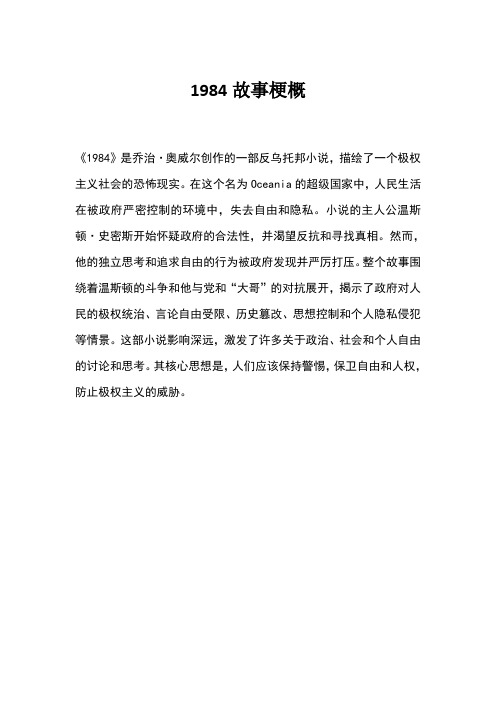
1984故事梗概
《1984》是乔治·奥威尔创作的一部反乌托邦小说,描绘了一个极权主义社会的恐怖现实。
在这个名为Oceania的超级国家中,人民生活在被政府严密控制的环境中,失去自由和隐私。
小说的主人公温斯顿·史密斯开始怀疑政府的合法性,并渴望反抗和寻找真相。
然而,他的独立思考和追求自由的行为被政府发现并严厉打压。
整个故事围绕着温斯顿的斗争和他与党和“大哥”的对抗展开,揭示了政府对人民的极权统治、言论自由受限、历史篡改、思想控制和个人隐私侵犯等情景。
这部小说影响深远,激发了许多关于政治、社会和个人自由的讨论和思考。
其核心思想是,人们应该保持警惕,保卫自由和人权,防止极权主义的威胁。
1984赏析

1984赏析《1984》是乔治·奥威尔(George Orwell)于1949年出版的一部经典小说。
它以极大的预见性和深度描述了一个极权主义社会的形象。
这部小说揭示了个人权利的摧毁、政府操控人民思想的可怕程度以及真理的扭曲。
通过细腻的描写和恐怖的情节,奥威尔成功地向读者展现了一个反乌托邦的世界,强调了个人自由和言论的重要性。
在这个小说中,作者将故事背景设定在一个被称为“Oceania”的国家。
这个国家完全被一个叫做“党”的政治组织所控制。
政府通过不断改写历史、监视人民以及进行大规模的宣传来维持统治。
在这个社会中,人们的思想和行为都受到严格的限制,大部分的自由被夺走。
每个人都不得不接受党的意识形态,并不断被迫参与到对政府的膜拜和颂扬中。
《1984》的主角温斯顿·史密斯是一个普通的党员,但他对现实中的极权主义体制感到不满,并有追求真理和自由的渴望。
他开始记录和思考自己内心的真实感受,这在整个小说中展示了个体反抗的可能性。
温斯顿在这个全然被监视的社会中,与一个叫茱莉娅的女性发起了一段禁忌的爱情。
通过这段爱情,小说揭示了个人情感的力量,以及人类对自由和真实的渴望。
《1984》的名字来自于小说中的特殊日期“1984年”。
这个数字表明了小说中党对时间和历史的扭曲。
在党的宣传中,他们声称已经取得了胜利,消灭了一切反抗,完全消除了自由思想的可能性。
然而,温斯顿和其他一些人并不接受这种扭曲的真理,他们试图揭示党所控制的谎言,并保持自己内心的自由。
小说中的另一个重要角色是“Big Brother”(老大哥)。
他是党的象征,人们要时刻听从他的命令和指示。
奥威尔通过刻画老大哥的形象,强调了政府控制下的权威和恐惧对于个体的打击。
老大哥的面孔无处不在,人们被告知他能看到一切,这种普遍的监视和恐惧感加深了读者对这个社会的恐怖感受。
通过细腻的描写和恐怖的情节,奥威尔成功地揭示了极权主义对人类自由的极端威胁。
《1984》赏析

《1984》赏析《1984》是乔治·奥威尔(George Orwell)于1949年出版的一部反乌托邦小说,也是他最为著名的作品之一。
小说以极其细腻的笔触描绘了一个极权主义社会的恐怖和压抑,让读者对集权政府和政治操控产生了深思。
小说的背景设定于名为Oceania的虚构国家,该国处于持续的战争状态之中。
故事主要围绕着主人公温斯顿·史密斯(Winston Smith)展开,他是一个无声的反抗者,试图在那个充斥着监视和思想控制的社会中寻找真理和自由。
在Oceania中,政府通过雄厚而普遍的监视系统来剥夺人们的隐私和个人自由。
政府不仅通过各种手段监视着每一个人的动态,还强制性地改变历史和文字的含义,不断重塑人们的思维方式。
另外,政府还创造了一个用于思想统治的新语言——新话(Newspeak),以限制人们的思考和表达能力。
温斯顿是一个为了自由而奋斗的个体,他意识到了权力和控制背后的恶意,并决心推翻这个充满谎言和恐怖的社会秩序。
他与朱利娅(Julia)展开了一段秘密的爱情,试图通过这份爱情的力量来抵抗专制政府的统治。
然而,他们的努力最终以失败告终,两人被逮捕并受到系统的残酷审判。
通过《1984》,奥威尔揭示了极权主义社会下人性的沦丧和个人自由的重要性。
小说中的片段不仅提醒我们权力滥用的危险,还向我们展示了一个无差别、没有隐私和思想自由的可怕世界。
小说还涉及到对真相和历史的改变。
政府通过媒体和宣传工具来篡改历史、制造谎言,以维持统治的合法性和稳定社会。
这个情节让读者反思了信息的可信度和背后的意图,对于我们现实生活中的政治操控和信息控制有着深远的启示。
此外,在小说中,奥威尔还通过描述政府的使用暴力和更加极端的手段来镇压反对者,引发了对于权威和腐败的探讨。
小说中的战争和暴力镜头,无一不在提醒着读者权力滥用对个体和社会造成的破坏性后果。
尽管《1984》以其压抑的氛围和悲观的主题而闻名,却在全球范围内产生了深远的影响。
1984书简介
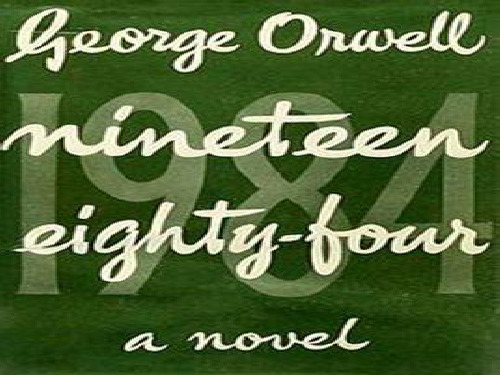
这部作品被译为60余种文字,并获得包括美国时代周刊“1923年至今最好的100本英文小说” 在内的多项奖项。
僵 硬 体 制 下
政治性再教育中,温斯顿承认
了他的罪行,但没有供出同伙
和他心爱的裘利亚。重返社会
的第二阶段再教育中,奥勃良 让温斯顿明白自己“已经烂掉
忏
了”。反驳说党无法成功(虽 然后来被奥勃良驳倒),温斯 顿承认:“我没有背叛裘利 亚。”奥勃良了解,虽然温斯 顿招供了关于他和裘莉亚的一 切,他并没有背叛她,因为他 “没有停止爱她;他对她的感
量超过5000万册。
奥威尔用温尔顿写日记的形式,来讽刺当时的人们。他写道, 千篇一律的时代,孤独的时代,老大哥的时代,双重思想的时代, 向未来,向过去,向一个思想自由、人们各不相同、但并不孤独 生活的时代——向一个真理存在、做过的事不能抹掉的时代致敬!
他想,他已经死了。他觉得只有到现在,当他开始能够 把他的思想理出头绪的时候,他才采取了决定性的步骤。一切 行动的后果都包括在行动本身里面。他写道: 思想罪不会带来死亡:思想罪本身就是死亡。他用小说的形式 来表达当代人的心声,有的人死了却还活着,有的人活着,却已 经死了,我想这句话用来形容当时的人,在合适不过了。
无
自
战
知
由
争
即
即
即
力
奴
和
量
役
平
温斯顿有一天突然接到了女孩茱莉亚的示爱,长期处于感情压抑 的他接受了女孩的爱。两个人在小心翼翼地躲开国家监视的同时,进 行地下的秘密幽会。温斯顿和茱莉亚的感情慢慢升温,对畸形的社会 体制也有了进一步的思考。但这段温馨的时光并没有持续太久,两人 的感情还是被警察发现了。
- 1、下载文档前请自行甄别文档内容的完整性,平台不提供额外的编辑、内容补充、找答案等附加服务。
- 2、"仅部分预览"的文档,不可在线预览部分如存在完整性等问题,可反馈申请退款(可完整预览的文档不适用该条件!)。
- 3、如文档侵犯您的权益,请联系客服反馈,我们会尽快为您处理(人工客服工作时间:9:00-18:30)。
IntroductionNineteen Eighty-Four, is a dystopian novel by George Orwell published in 1949.A dystopia is a community or society that is in some important way undesirable or frightening. It is the opposite of a utopia.When George Orwell had finished writing a political fiction book in 1948, he looked for a title. As the subject of his book was a pessimistic political vision, needing a futur e dimension, he decided that it might be a good idea to simply invert the last two digit s of the year during which the book was written - and call it "1984.Anti-Utopia Trilogy 反乌托邦三部曲前苏联的叶.扎米亚京的《我们》英国阿道司・赫胥黎Aldous Huxley的《美丽新世界》以及最有名的乔治·奥维尔的1984backgroundin 1984, after a global war,nuclear weapon destoryed previous social order and civilization process, the world broken into three super countries in 1984.Ocean States, Eurasian [juə'reiʃən and East Asian countries(大洋国、欧亚国和东亚国)The story happened In London, the Airstrip One capital city of Oceania.The social class system of Oceania is threefold:(I) the upper-class Inner Party, the elite ruling minority, who make up 2% of the population.(II) the middle-class Outer Party, who make up 13% of the population.(III) the lower-class Proles (from proletariat), who make up 85% of the population and represent the uneducated working class.The leader of this government is a fictional figure known as “Big Brother” , all citizens must love and respect him. In this society, there is no privacy and freedom, also, there is no friend, only comrades.The independents had been cleaned up.The political power was finnal target and authority. People are constantly monitored by telescreens and subjected to a constant barrage of propaganda.The Party controls everything in Oceania, even the people’s history and language. Thinking rebellious thoughts is illegal,thoughtcrime is the worst of all.In the year 1984, Ingsoc (English Socialism), is the regnant ideology of Oceania, and Newspeak is its official language of official documents.War is peaceFreedom is slaveryIngnorance is strengthMinistries of OceaniaThe Ministry of Peace :supports Oceania's perpetual war.The Ministry of Plenty: rations and controls food,goods, and domestic production.The Ministry of Truth controls information: news, entertainment, education, and the arts. Winston Smith works in the Minitrue RecDep (Records Department), "rectifying" historical records to concord with Big Brother's current pronouncements, thus everything the Party says is trueThe Ministry of Love: which deals with law and order (torture and Brainwashing).The Ministry of Love identifies, monitors, arrests, and converts real and imagined dissidents.PlotAn English novel about life in a dictatorship as lived by Winston Smith, an intellectual worker at the Ministry of Truth, and his degradation when he runs afoul of the totalitarian (极权主义的) government of Oceania (大洋洲), the state in which he lives in the year that he presumes is 1984.Big Brother- Though he never appears in the novel, and though he may not actually exist, Big Brother, the perceived ruler of Oceania, is an extremely important figure.A minor member of the ruling Party in near-future London, Winston Smith is a thin, frail, contemplative, intellectual, and fatalistic thirty-nine-year-old. Winston hates the totalitarian control and enforced repression that are characteristic of his government. He harbors revolutionary dreams.Julia- Winston’s lover, a beautiful dark-haired girl working in the Fiction Department at the Ministry of Truth. Julia enjoys sex, and claims to have had affairs with many Party members. Julia is pragmatic and optimistic. Her rebellion against the Party is small and personal, for her own enjoyment, in c ontrast to Winston’s ideological motivation.O’Brien- A mysterious, powerful, and sophisticated member of the Inner Party whom Winston believes is also a member of the Brotherhood.Mr. Charrington - An old man who runs a secondhand store in the prole district. Kindly and encouraging, Mr. Charrington seems to share Winston’s interest in the past. He also seems to support Winston’s rebellion against the Party and his relationship with Julia, since he rents Winston a room without a telescreen in which to carry out his affair. But Mr. Charrington is not as he seems. He is a member of the Thought Police. Mr. Charrington, the proprietor of the store, is revealed as having been a member of the Thought Police all along.Winston Smith is a low-ranking member of the ruling Party in London, in the nation of Oceania.As the novel opens, Winston feels frustrated by the oppression and rigid control of the Party, which prohibits free thought, sex, and any expression of individuality. Winston dislikes the party and has illegally purchased a diary in which to write his criminal thoughts.Winston works in the Ministry of Truth, where he alte rs historical records to fit the needs of the Party. He notices a coworker, a beautiful dark-haired girl, staring at h im, and worries that she is an informant who will turn him in for his thoughtcrime. One day, Winston receives a note from the dark-haired girl that reads “I love you.” She tells him her name, Julia, and they begin a covert affair,. Eventually they rent a room above the secondhand store in the prole district where Winston bought the diary. This relationship lasts for some time. Winston is sure that they will be caught and punished sooner or later (the fatalistic Winston knows that he has been doomed since he wrote his first diary entry), while Julia is more pragmatic and optimistic. As Winston’s affair with Julia progresses, his hatred for the Party grows more and more intense. At last, he receives the message that he has been waiting for: O’Brien wants to see him.Winsto n and Julia travel to O’Brien’s luxurious apartment. As a member of the powerful Inner Party (Winston belongs to the Outer Party), O’Brien leads a life of luxury that Winston can only imagine. O’Brien confirms to Winston and Julia that, like them, he hates the Party, and says that he works against it as a member of the Brotherhood. He indoctrinates Winston and Julia into the Brotherhood, and gives Winston a copy of Emmanuel Goldstein’s book, the manifesto of the Brotherhood. Winston reads the book—an amalgam of several forms of class-based twentieth-century social theory—to Julia in the room above the store. Suddenly, soldiers barge in and seize them. Mr. Charrington, the proprietor of the store, is revealed as having been a member of the Thought Police all along.Torn away from Julia and taken to a place called the Ministry of Love, Winston finds that O’Brien, too, is a Party spy who simply pretended to be a member of the Brotherhood in order to trap Winston into committing an open act of rebellion against the Party. O’Brien spends months torturing and brainwashing Winston, who struggles to resist. At last, O’Brien sends him to the dreaded Room 101, the final destination for anyone who opposes the Party. O’Brien straps a cage full of rats onto Winston’s head and prepares to allow the rats to eat his face. Winston snaps, pleading with O’Brien to do it to Julia, not to him.Giving up Julia is what O’Brien wanted from Winston all along. His spirit broken, Winston is released to the outside world. He meets Julia but no longer feels anything for her. At last, he becamean ilde drunk, accepted the thought theroy of party. He recognized " he defeated himself. He loves big brother. ”In 1998, the Modern Library ranked Nineteen Eighty-Four 13th on its list of the 100 b est English-language novels of the 20th century. Many of the terms and concepts in G eorge Orwell’s 1984 have entered contemporary society. For example, your average e ducated citizen will understand terms like Big Brother, double think, and Newspeak. Moreover, as a result of the novel, the adjective Orwellian has entered the English voc abulary. Orwellian refers to a totalitarian regime’s use of propaganda, close surveillan ce of citizens, and/or manipulation of the pastThe destructiveness of totalitarianism and the human love of power for powers sake.Famous RemarkWho controls the past controls the future; who controls the present controls the past. Thoughtcrime does not entail death: thoughtcrime is death.Freedom is the freedom to say that two plus two make four.Under the spreading chestnut tree ,I sold you and you sold me。
